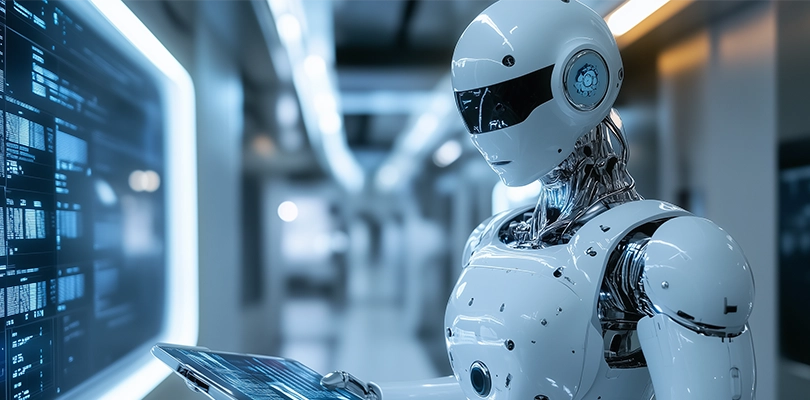Definitions of Artificial Intelligence and Robotic Process Automation (RPA)

As technology rapidly evolves in the modern business world, artificial intelligence (AI) and robotic process automation (RPA) emerge as two critical elements redefining business processes. Both technologies offer time and cost savings by automating business processes, but the fundamental differences between them play a crucial role in determining which technology businesses should prefer.
While artificial intelligence refers to the ability of computers to perform tasks with human-like intelligence, RPA refers to software that automates repetitive tasks based on specific rules. So, how do these two technologies function in business processes, and how do they differ from each other?
The Importance of Automation in the Business World
Automation of business processes is vital for businesses to gain a competitive advantage and increase operational efficiency. Automation reduces costs by minimizing human errors and allows employees to focus on strategic tasks. In this context, emerging technologies like artificial intelligence and the long-used RPA are at the heart of automation strategies.
Automation of Business Processes with Artificial Intelligence
Artificial intelligence is a general term for systems that use technologies such as machine learning, deep learning, and natural language processing to mimic human intelligence. These systems learn by analyzing large datasets, make predictions, and make decisions. For example, a customer service chatbot can quickly and accurately respond to customer inquiries thanks to AI algorithms.
Advantages of Automating with Artificial Intelligence
Automating business processes with AI offers several advantages to businesses:
| Continuous Learning and Improvement | Successfully Completing Complex Tasks | Data-Driven Decision Making |
|---|---|---|
| AI systems continuously improve their performance by collecting and analyzing more data over time. | AI can handle complex tasks that require human intelligence. For instance, an AI system can analyze medical images and diagnose diseases. | AI enables businesses to make more accurate and data-driven decisions through big data analytics. |
RPA (Robotic Process Automation) What is RPA?
RPA refers to software that automates repetitive and rule-based business processes. RPA bots mimic the tasks performed by a human on a computer and execute them automatically. For example, an RPA bot can perform routine tasks such as invoice processing, data entry, and updating customer information.
RPA Use Cases and Benefits
RPA is ideal for automating repetitive and time-consuming tasks:
- Speed and Efficiency: RPA bots work much faster than humans and can operate 24/7 without interruption.
- Fewer Errors: RPA eliminates human errors, enhancing the accuracy of business processes.
- Easy Integration: It is easy to integrate into existing systems and does not require significant investments.
Key Differences Between AI and RPA Technological Differences
The most notable difference between AI and RPA lies in their technological foundations. While AI uses complex algorithms and machine learning techniques to analyze data and make predictions, RPA automates tasks based on specific rules. AI systems can make complex decisions with learning and adaptation capabilities, whereas RPA bots are bound to predefined rules.
Use Cases and Application Areas
The application areas of AI and RPA also differ. While AI is widely used in areas such as customer service, healthcare, finance, and marketing, RPA is primarily used for automating repetitive tasks in back-office operations, accounting, human resources, and supply chain management.
AI or RPA? Factors to Consider in the Decision-Making Process Decision Criteria
There are several factors that a business should consider when deciding whether to choose AI or RPA:
- Task Complexity: If the tasks to be automated are complex and variable, AI is a more suitable solution. For example, analyzing customer behavior and developing personalized marketing strategies are more effective with AI.
- Task Repetition: If the tasks are repetitive and based on specific rules, RPA offers a more efficient solution. For instance, processes like invoice processing and data entry can be completed faster and more accurately with RPA.
Preferences by Industry
Different industries have different automation needs. For example:
- Finance Sector: RPA is ideal for repetitive tasks such as accounting and financial reporting, while AI is used for complex tasks like risk analysis and customer segmentation.
- Healthcare Sector: AI stands out in complex tasks like disease diagnosis and patient data analysis, while RPA is used for routine tasks like patient record management and billing.
Conclusion
Future Trends
As automation technologies continue to evolve rapidly, these technologies will help businesses increase efficiency, reduce costs, and gain a competitive advantage in the future. Especially with more advanced data analytics and machine learning, AI is expected to become more sophisticated, continuing to make a difference in the business world.
Strategic Recommendations
When determining automation strategies, businesses should carefully evaluate the strengths and application areas of AI and RPA. AI is preferred for complex and variable tasks, while RPA is more suitable for repetitive and rule-based tasks. Additionally, integrating both technologies can enable businesses to achieve greater efficiency and competitive advantage.
In conclusion, AI and RPA are two powerful technologies that complement each other in the automation of business processes. With the right strategy and implementation, businesses can maximize the benefits of these technologies and be better prepared for the future.
Should you have any queries or need further details, please contact us here.
Notification!




